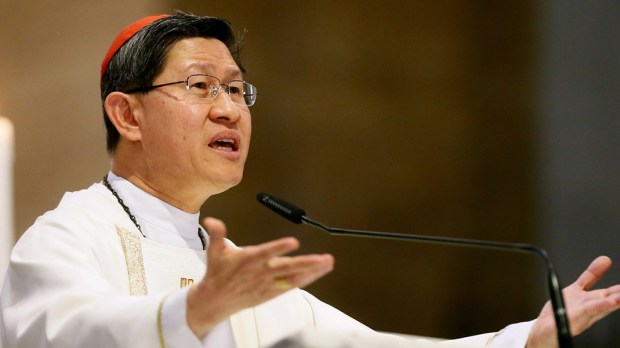“Let me begin by putting it bluntly: The war against illegal drugs is far from over. The illegal drugs war will not be sidelined.” said Philippino president Duterte in a prepared speech earlier this week.
As the the Philippines enters their 3rd year under the leadership of Duterte, Catholic leaders are voicing their concerns with the president’s apparent disregard for human rights.
In a recent public address, Duterte commented to his critics, “Your concern is human rights, mine is human lives,” He continued, “The lives of our youth are being wasted and families destroyed, and all because of chemicals called shabu, cocaine, cannabis, and heroin.”
UCA news reports the comments did not sit well with Bishop Pablo Virgilio David of Kalookan, vice president of the bishops’ conference, who’s diocese has seen the most killings in the last 3 years. In a facebook comment he argued:
“Such a statement implies that the victims of drug-related killings are not human. Is not the right to life the most basic human right?”” He continued, “With all due respect, the church can never agree with such a statement,” said Bishop David, adding that for the church, drug dependents “are sick people” who need rehabilitation.
The prelate went on to suggest that the government should focus their attention on the distributors of drugs, rather than the victims of addiction.
Since Dueterte assumed office in 2016, the Philippine National Police claim more than 4,500 people were killed in legitimate anti-drug operations. However, human rights groups claim the number is closer to 23,000.
In a speech at Fifth Philippine Conference on New Evangelization, Cardinal Luis Antonio Tagle of Manila asked the question, “Do you rejoice at the deaths of the innocent?” after a statement was released by the country’s Catholic bishops condemning a wave of killings across the country.
At the podium, Cardinal Tagle had tears in his eyes as he prayed to God, “We want to believe that you do not rejoice in their death. But there are so many of them,” He continued, “Where do we see your face? Where do we hear your word? Some people are asking, where are you?”
Fish-shaped bread was distributed to the 8,000 attendees at the summit, before the prelate charged those present to become “bread” for others amid the hunger in the world:
“Let us be bread, broken, shared for others so that we are all moved with compassion and can feed others. All that we have, all that we are, if taken, blessed and shared can become the bread of life for all. Faced with so many kinds of hunger in our world we hear the words of Jesus: You give them something to eat.”

